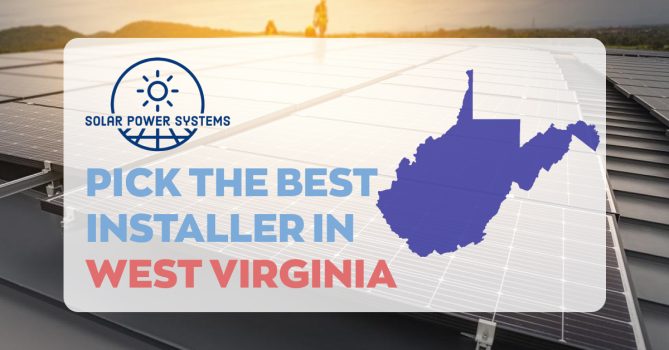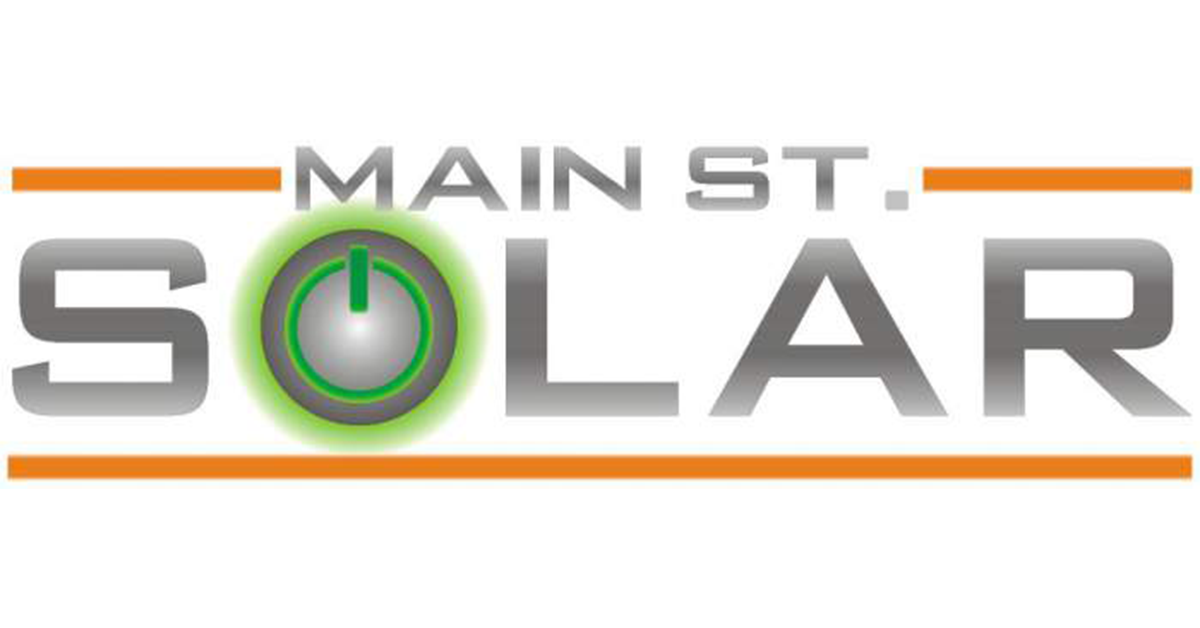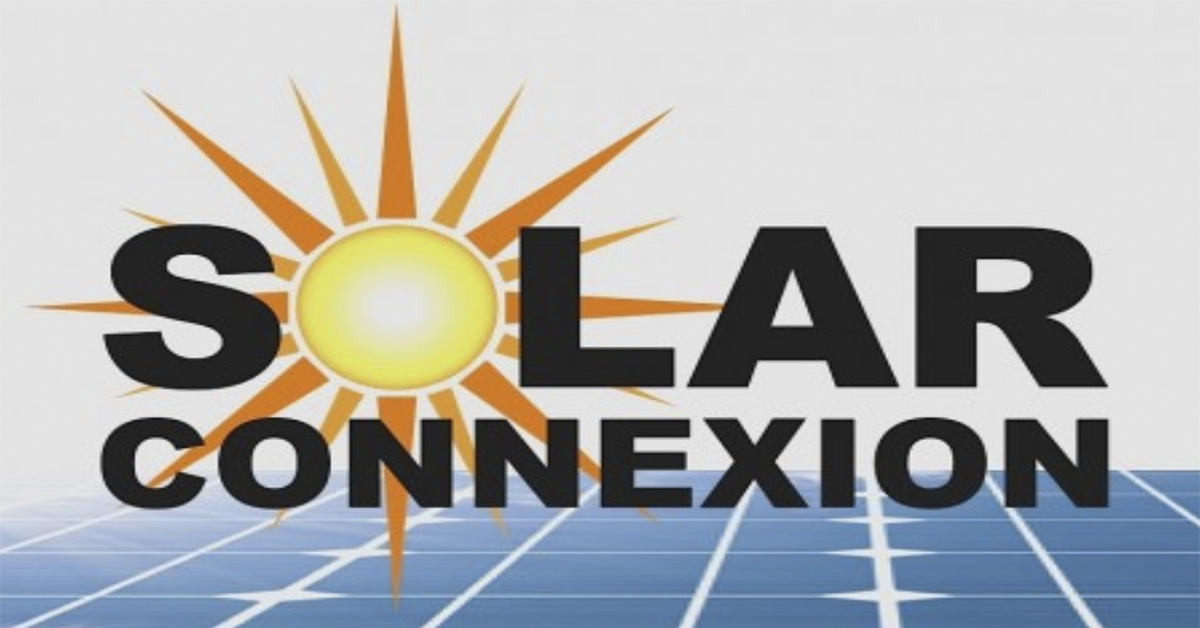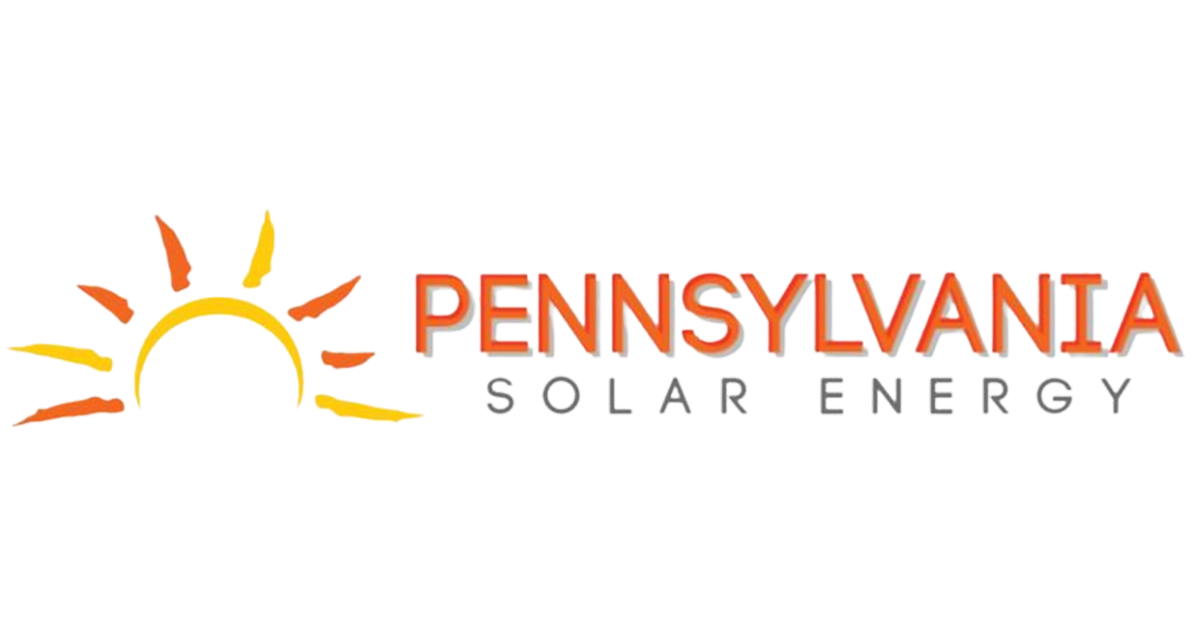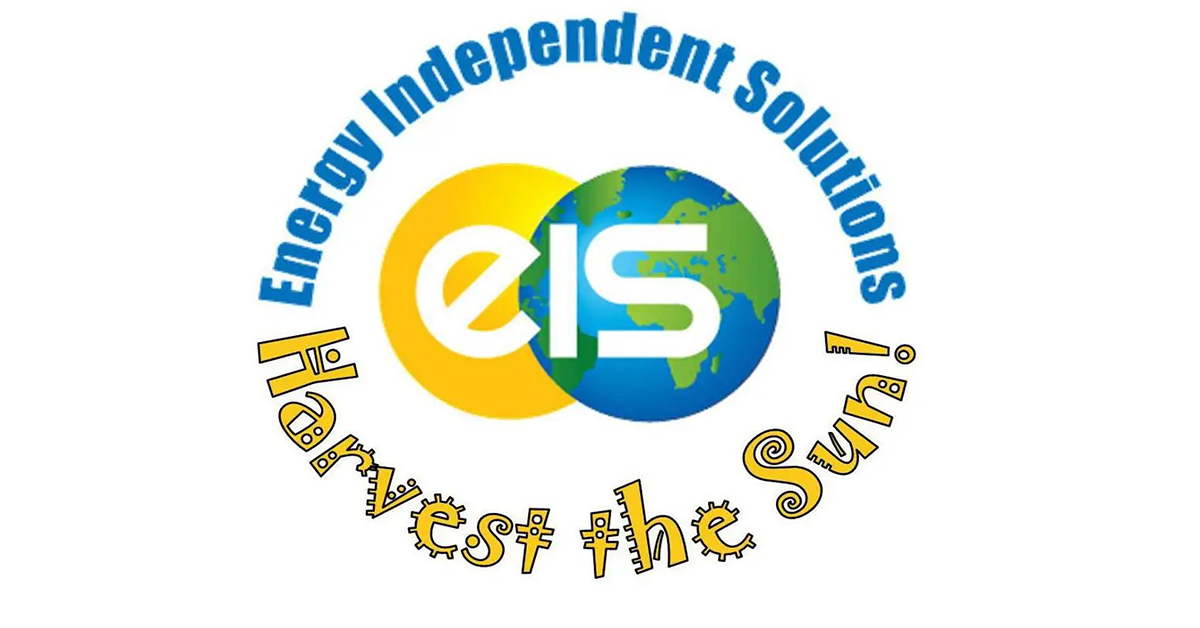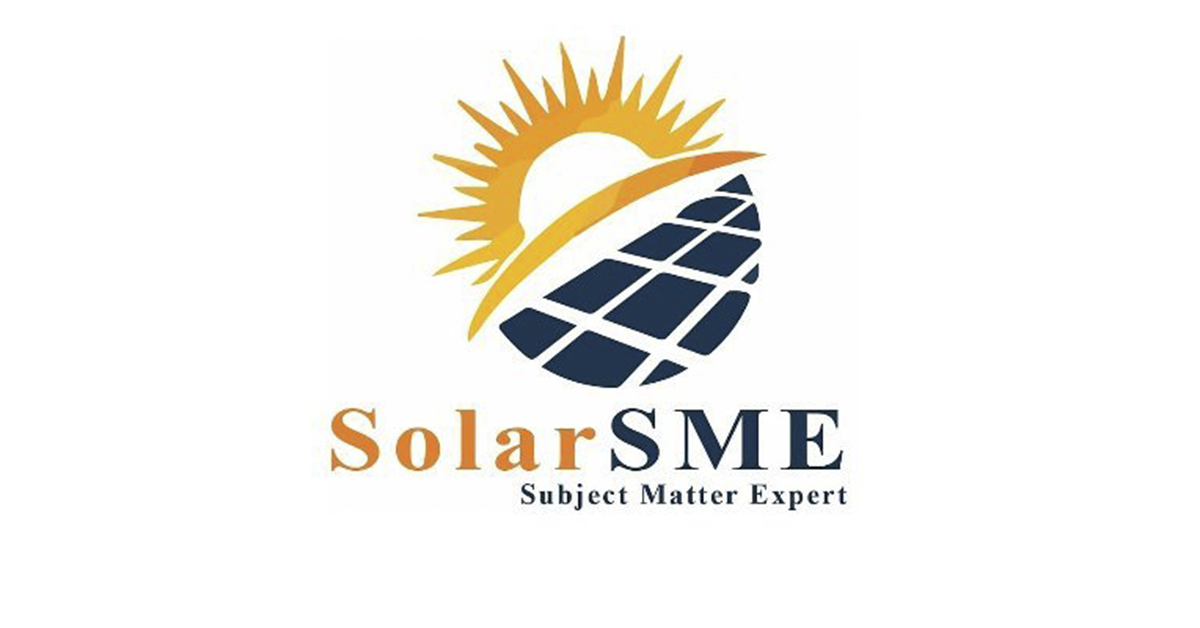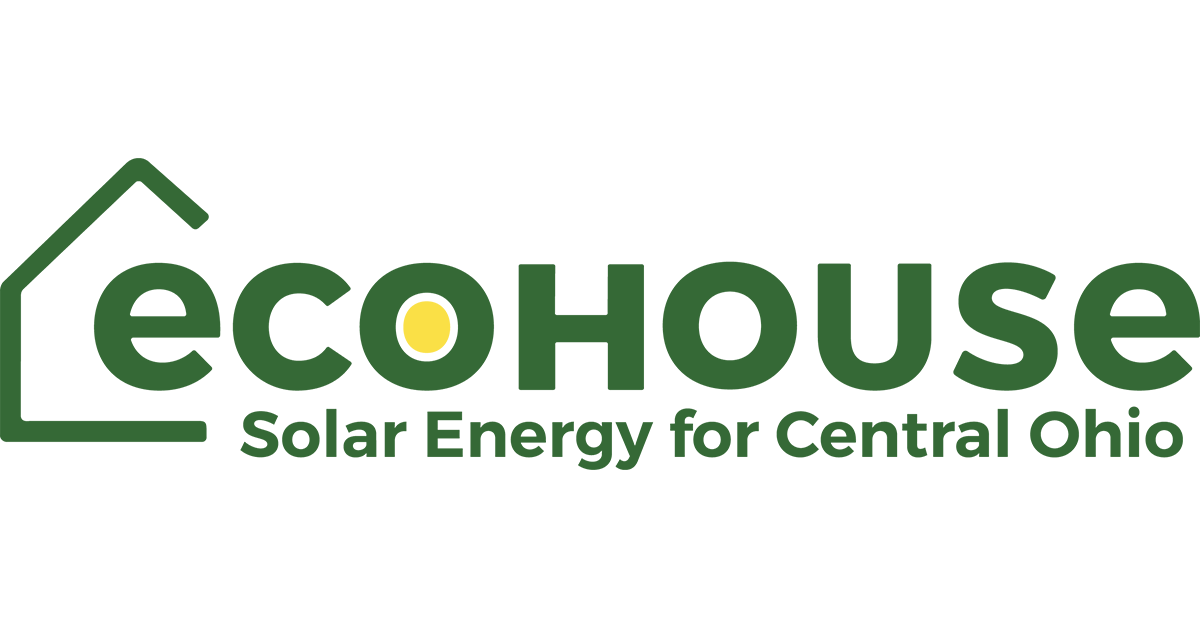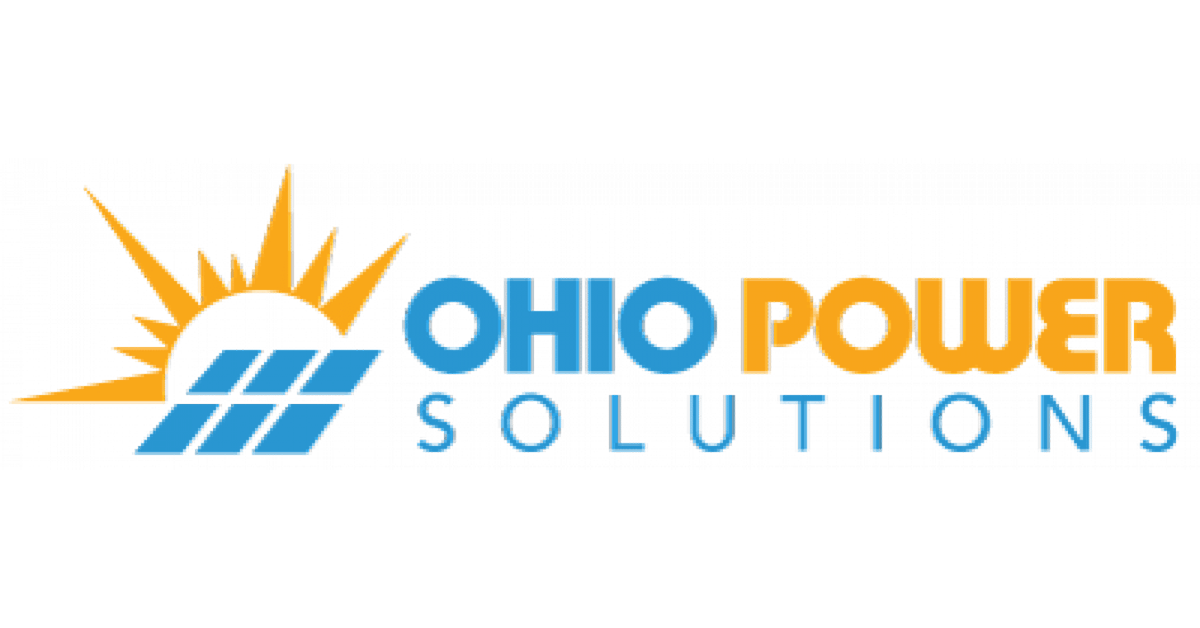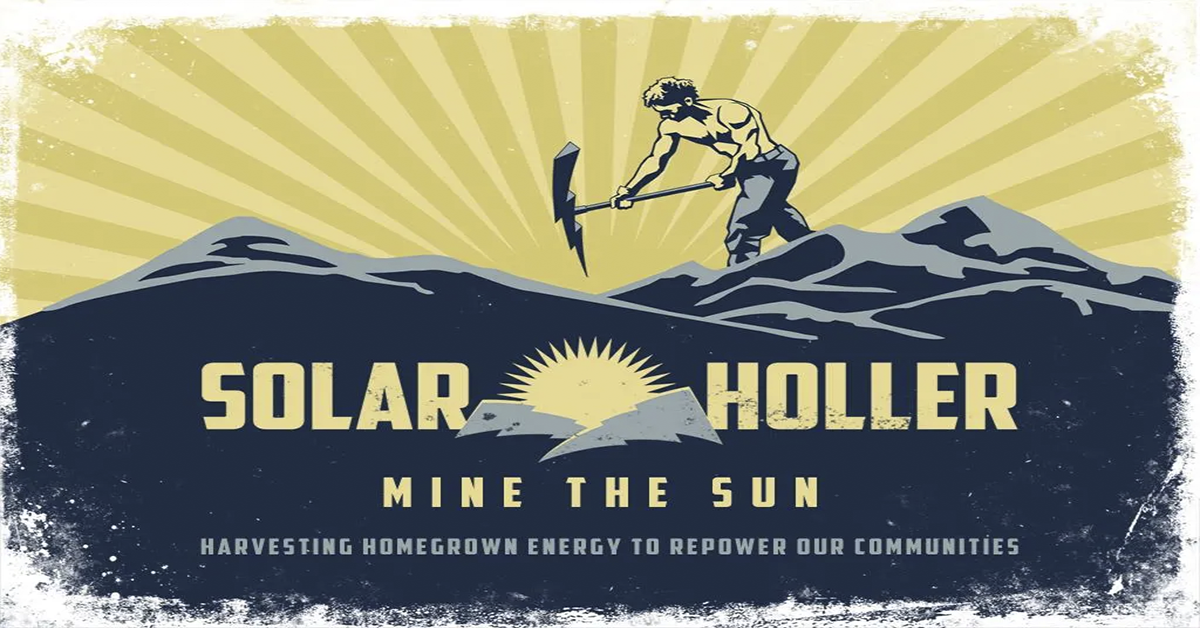West Virginia’s rugged landscapes brim with solar potential. But finding a top installer? That can get tricky. With recent law changes, solar’s more accessible here. Our guide sheds light on stellar West Virginia installers. We’ve considered local climate quirks, state-specific incentives, and customer satisfaction. Dive into our expert evaluations and find your perfect solar partner in the Mountain State. Let’s make your switch to solar smooth and savvy. Get ready to harness West Virginia’s ample sunshine with a trusted installer that understands your needs and the region’s unique solar landscape.
Find the Best Solar Installers in West Virginia
We have compiled ratings of local solar installers in West Virginia and recommend proven solar panel installation companies you can trust.
Use the search form to find more local solar installers in your area. Enter the Address or Zip Code and choose the distance range from your location.
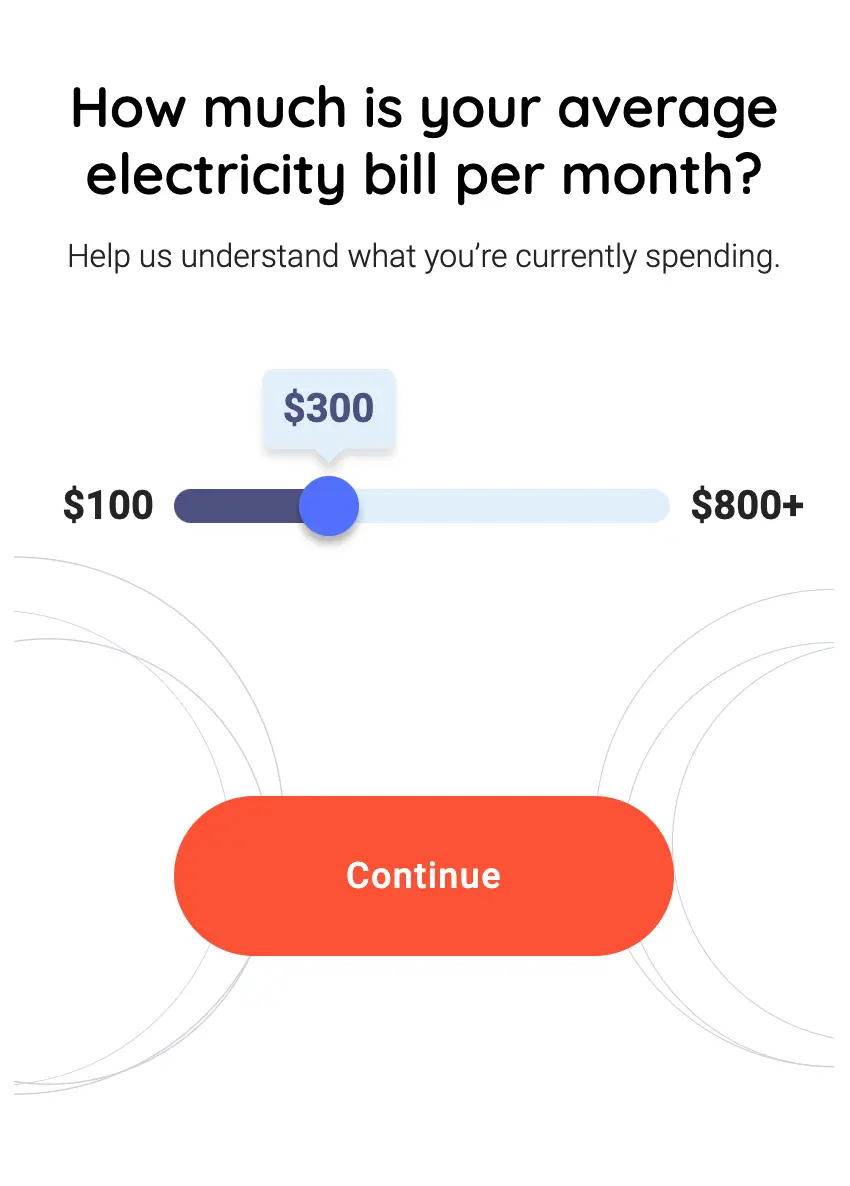
Why Go Solar in West Virginia?
In the rugged and rolling hills of West Virginia, residents have an exceptional opportunity to harness the natural power of the sun. Solar energy presents a wealth of benefits for West Virginians – it’s not just good for the environment, but also for your wallet. By making the switch to solar, homeowners can reduce their reliance on traditional energy sources, thereby decreasing electricity bills, and often, the savings over time can be substantial. Furthermore, solar power systems are known for their durability and low maintenance costs, which means more peace of mind for you. Amid the shift to cleaner energy, West Virginia also offers state-specific incentives and programs that can make the initial setup costs more affordable. By reducing carbon footprints and supporting local energy jobs, solar power contributes to a greener, healthier state. More than just a financial investment, going solar in West Virginia represents a commitment to a sustainable future, demonstrating the forward-thinking mindset that empowers individuals and communities alike.
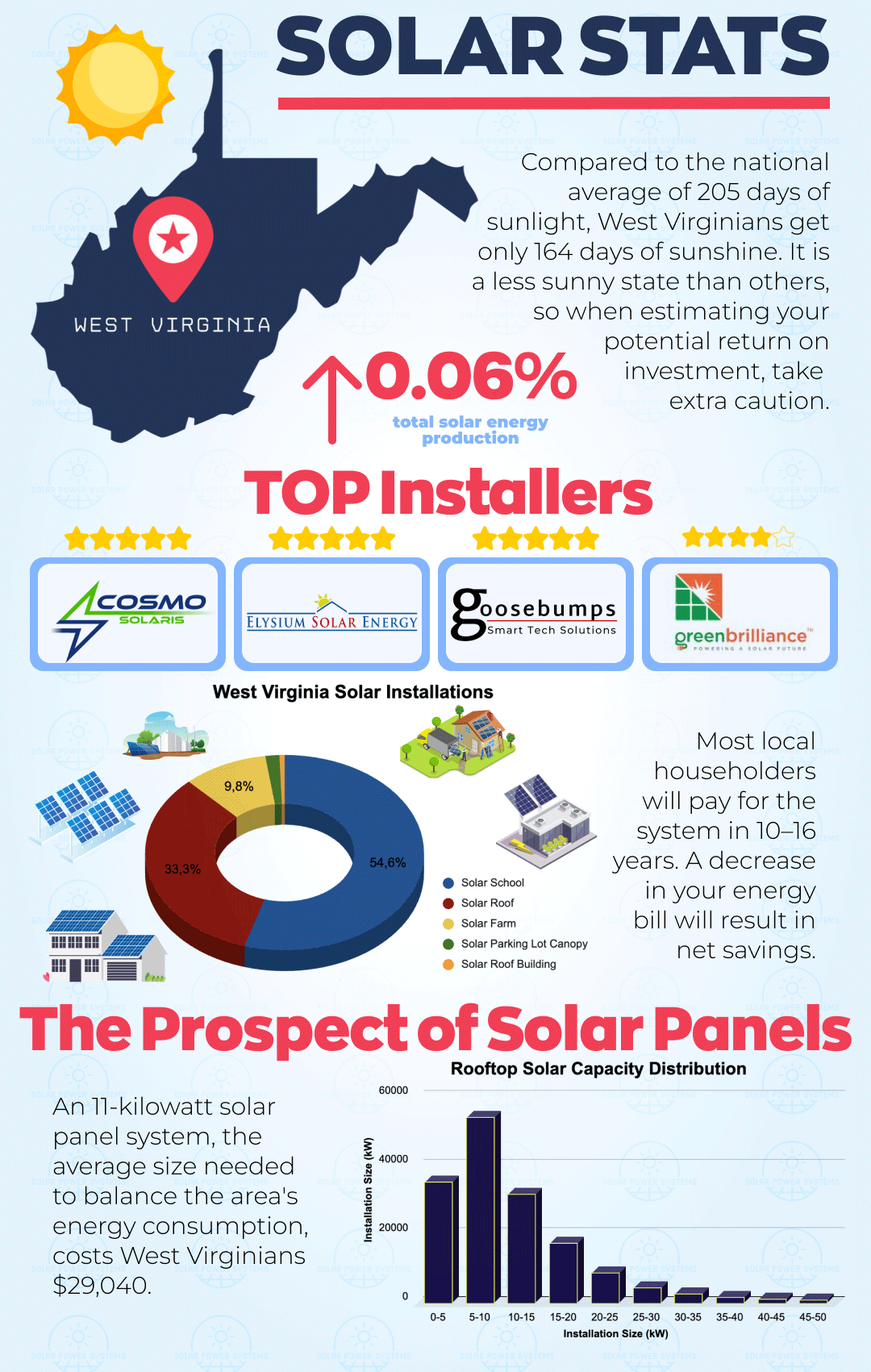
How Solar Can Save You Money in West Virginia
In West Virginia, the average residential electricity rate hovers around 12 cents per kilowatt-hour (kWh), which is lower than the national average. Despite this, many homeowners are still seeing the benefits of installing solar panels to reduce their dependence on traditional electricity sources and to save on long-term energy costs.
Installing solar panels can be a significant upfront investment, but the return over time is often quite appealing. For instance, the average solar panel system size in West Virginia might range from 5 to 10 kW, which could cost between $15,000 and $25,000 pre-incentive. However, after accounting for federal tax credits and any local incentives, homeowners could see substantial reductions in this initial outlay.
A case study to illustrate the potential savings would involve a West Virginian household that consumes about 1,200 kWh per month. After installing a 10 kW solar panel system, which on average may generate roughly 1,200 kWh per month (accounting for the average solar irradiance in the area), they could potentially eliminate their electric bill. Over a 25-year period, considering the average electricity rate growth, the savings could very well exceed $30,000, depending on the exact size of the system installed and energy usage.
Moreover, West Virginia’s net metering policies enhance the benefits of solar installation. Net metering allows homeowners to receive credit on their electric bill for any surplus energy their system generates and returns to the grid. This policy means during sunny periods when the panels might produce more electricity than used, the excess isn’t wasted. Instead, it offsets the costs during times when the system underproduces, such as during cloudy days or overnight.
This policy, combined with the declining costs of solar technology and the rise in electricity prices, often makes solar an attractive investment for homeowners in West Virginia. While the exact savings will vary per household, the combination of federal incentives, potential state and local incentives, and net metering can make solar panels a compelling financial decision for those looking to cut their energy costs and increase their energy independence.
Getting Solar Quotes in West Virginia
When you’re diving into solar for your West Virginia home, there’s a roadmap to follow in order to fully understand the final quote for a solar installation. Let’s illuminate the path together.
At the core of your solar quote will be the hardware costs. This covers the panels themselves, inverters, mounting equipment, and other electrical accessories essential to harvest the sun’s energy. It’s important to remember that the choice of high-efficiency panels may have a higher upfront cost but can lead to more savings in the long run.
The installation fees capture the labor involved in getting your panels up and running. This can fluctuate based on the complexity of your roof, the readiness of your electrical system for solar integration, and the scale of the system you’re opting for. The expertise of your installer and local labor rates may also influence this fee.
You may also encounter post-installation services in your quote, which set the stage for a smooth solar journey. These include system monitoring, maintenance, potential repairs, and the handling of permits and inspections. A robust warranty can significantly boost the value of your investment, ensuring the protection of both parts and labor, sometimes up to a generous 25 years.
Understanding your solar payback period is vital—it’s the time it takes for the savings from your solar system to cover the initial investment. This period hinges on energy cost savings, which are projected based on your system’s performance estimates. Accurate appraisals of sunshine exposure, system size, and efficiency play a key role in these calculations.
Financing options can vary, keeping West Virginia’s economic landscape in mind. Loans, leases, and power purchase agreements (PPAs) can shift the financial dynamics, tailoring the solar experience to your financial comfort zone.
Let’s not overlook West Virginia-specific incentives that might sweeten your deal. While the Mountain State may not flaunt as robust a suite of solar incentives as some other regions, there are still opportunities to reduce the cost burden, like net metering and the federal solar tax credit which, despite not being state-specific, can still make a substantial dent in overall costs.
Getting acquainted with these elements of your solar quote ensures you step into solar with eyes wide open, ready to soak up the sunny rewards with confidence.
Why Hire a Local Solar Company in West Virginia?
Choosing a local solar company in West Virginia brings several distinct advantages to your solar project, heightened by the nuanced understanding local firms have of the Mountain State’s climate, regulations, and available solar incentives. West Virginia experiences a full range of seasons, and a local solar installer will have the expertise to design a system that can withstand heavy snowfall in winter and maximize sun exposure during the sunny parts of the year.
These companies are not just experts in harnessing sunlight; they are also well-versed in navigating the terrain of state-specific incentives. West Virginia offers programs like net metering and potential tax advantages that can significantly offset the initial investment in solar technology. A local installer’s proficiency in these areas translates into a smoother process for obtaining these benefits, ensuring you’re not leaving any savings on the table.
When it comes to the safety and professionalism of the installation, local solar companies maintain a high standard. They are typically staffed with certified technicians who follow the latest industry practices to ensure your setup is both safe and efficient. This expertise minimizes the risk of malfunctions or safety hazards, providing you with the peace of mind that comes from a job well done.
Furthermore, professional installation is crucial for warranty protection. Most solar panels come with long-term manufacturer warranties, and proper installation is often a condition of these warranties. Local installers build systems that adhere strictly to the manufacturer’s specifications, which protects your investment and can lead to a better return over the life of your system due to increased efficiency and reduced maintenance costs.
Partnering with a professional local solar installer ensures that not only is your system tailored to West Virginia’s unique environmental conditions, but you also gain the full advantage of state incentives. They optimize the installation for safety and longevity, all while safeguarding your warranty. By investing in professional local expertise, you set yourself up for a sustainable and profitable solar experience.
Solar Incentives in West Virginia
Solar incentives and rebates are essentially perks offered to homeowners to encourage the adoption of solar power. These financial benefits include tax credits, tax exemptions, rebates, and other programs that make solar installation more affordable and attractive. In West Virginia, homeowners who go solar can take advantage of a variety of incentives to reduce the initial cost and improve the ROI of their investment. These incentives lower the financial barriers to solar energy, helping you save money both upfront and over the lifetime of your solar panel system. Leveraging these incentives can significantly offset the installation costs and enhance the economic benefits of switching to renewable energy.
Here’s a guide to key solar incentives available in West Virginia:
| Incentive | Savings | Explanation | Type | Occurrence |
|---|---|---|---|---|
| Federal Solar Investment Tax Credit (ITC) | 26% of installation costs | The ITC allows you to deduct a significant percentage of your solar panel installation costs from your federal taxes. | Tax credit | One-time (phased-down annually) |
| Net Metering Policies | Variable (based on energy production and usage) | Net metering allows you to earn credits on your utility bill for excess energy your solar system exports to the grid. | Utility bill credit | Ongoing |
| Property Tax Exemption | 100% exemption on added property value from solar installation | Solar panels increase your home’s value, but in West Virginia, that added value is exempted from your property taxes. | Tax exemption | Ongoing |
| Solar Renewable Energy Credits (SRECs) | Variable (based on market value of SRECs) | For every megawatt-hour of solar power your system produces, you can earn an SREC which can be sold on the market. | Tradable credit | As produced |
Note: The specifics of these programs, particularly the local utility rebates and net metering policies, can vary. It’s important for residents to check with their local utility providers and stay updated with the current policies and incentives. The Federal Solar Investment Tax Credit is subject to change based on federal energy policies.
How to Choose the Right Solar Installer in West Virginia
When you’re eyeing solar power to light up your West Virginia home, choosing the right installer is as key as the sunrise. You want a company that’s like a ray of sunshine – reputable, efficient, and savvy with state-specific solar smarts. Here’s how to make sure you’re basking in the best service possible without getting burned.
First, check for licenses and certifications. Trustworthy installers wear their credentials like a badge of honor. Look for certification from the North American Board of Certified Energy Practitioners (NABCEP), a gold standard in the solar industry that ensures your installer has a sunspot-free record of expertise.
Reading reviews and customer testimonials shines a light on real-life experiences with the installer. Homeowners like you can provide bright insights into the installer’s performance, reliability, and customer service. It’s about tapping into the collective wisdom of fellow West Virginians who’ve already walked the solar path.
Now, compare quotes like you’re measuring sunlight hours. Prices can vary like summer and winter solstices, so getting multiple estimates gives you a clear view of the market. It’s the best way to ensure competitive pricing without compromising on quality.
And don’t overlook the company’s track record in West Virginia. A solar installer who knows the lay of the land – from the Appalachian hills to local weather patterns – means they’re well-equipped to tailor your solar setup for maximum efficiency.
Lastly, engage them about their experience with West Virginia’s local regulations and incentives. It’s essential to find an installer who is well-versed in state-specific solar policies and can help you capitalize on financial incentives to reduce your initial investment.
So before you leap into the solar leap, ensure you equip yourself with these tips. A brilliant solar investing experience in the Mountain State awaits, and with the right installer, every day can be as bright as the summer solstice!

Frequently Asked Questions
How much do solar panels cost in West Virginia State?
When considering the investment in a solar panel system in West Virginia, the cost can vary significantly based on several crucial factors. To give you an idea, the average cost of a residential solar panel system can range widely but typically falls between $15,000 to $30,000 before federal incentives. Here’s a breakdown of the factors that influence the price:
1. System Size: The size of a solar power system is a predominant factor in pricing. It’s measured in kilowatts (kW), where a larger system with more kW will cost more due to the higher number of solar panels required. Common residential system sizes range from 5 kW to 10 kW, while commercial installations may be larger.
2. Panel Types: Solar panels come in different types, which include monocrystalline, polycrystalline, and thin-film panels. Monocrystalline panels are usually more efficient and thus more expensive, while polycrystalline and thin-film options may offer a lower upfront cost but might be less efficient.
3. Installation Complexities: The cost of installation can be influenced by the complexity of your roof, such as its size, shape, and angle, along with any obstructions like vents or chimneys. Moreover, electrical upgrades, mounting systems, and the labor involved can cause variability in installation costs.
Remember, incentives and rebates can significantly reduce the out-of-pocket cost for a solar installation. The federal solar tax credit, for example, currently allows you to deduct 30% of the cost of installing a solar energy system from your federal taxes. Additionally, there may be state incentives and utility programs that further lower costs.
It’s worth noting that while these are some of the primary factors, there are additional considerations like the warranty period, the manufacturer’s brand, and local permitting fees which also influence the final price. It is advisable to get a few quotes from reputable solar installers to understand the specific cost for your situation and they can help you navigate the options to find the best fit for your energy needs and budget.
Is it worth going solar in West Virginia State?
Embracing solar energy in West Virginia offers a multitude of benefits, both personally and environmentally. Let’s chat about why making the switch to solar is a bright idea.
First up, let’s talk savings! Solar panels can significantly reduce your monthly electricity bills. Once your initial investment pays off, the savings really start to shine because the sun’s energy is free, and West Virginia’s net metering policy allows you to earn credits for excess power you generate.
Speaking of the environment, solar power is a clean, renewable resource. When you opt for solar, you’re cutting down on greenhouse gas emissions and dependency on fossil fuels. This move not only helps to combat climate change but also improves air quality, making West Virginia a healthier place to live.
There’s also the increased property value to consider. Homes with solar installations often sell at a premium, with buyers willing to pay more for a residence with lower operational costs.
In terms of reliability, solar power provides a consistent energy supply. Even on cloudy days, panels can still produce energy. Moreover, solar batteries can store energy for use during the night or power outages, increasing energy independence.
The state’s incentives and tax breaks further sweeten the deal. West Virginia provides tax credits, rebates, and financing options like solar loans and leases, making solar more accessible to homeowners.
In essence, shifting to solar in West Virginia is a worthwhile investment that benefits your wallet, your health, your home’s value, and our planet. It’s not just about being eco-friendly; it’s about embracing a sustainable lifestyle that offers long-term economic and environmental gains. So why wait? The future is bright and full of potential with solar power.
Will solar increase your home value in West Virginia State?
In West Virginia, the solar market is embracing the positive trends seen nationwide regarding property values. Installing solar panels is not just about sustainability; it’s a wise investment that can boost your home’s value. A study conducted by the Lawrence Berkeley National Laboratory found that homes with solar energy systems sell for a premium, with the increase in property value being an average of about $4 per watt of solar power installed. This is crucial for homeowners in West Virginia considering solar installations, as it can directly impact the return on investment.
Local real estate markets are starting to reflect these trends. Homebuyers are increasingly informed about the benefits of solar power, including the financial savings on energy bills, the reduced carbon footprint, and the potential tax incentives and rebates. Solar installations are becoming a highlighted feature in property listings, much like a renovated kitchen or a finished basement, drawing the attention of eco-conscious buyers who value energy efficiency.
Furthermore, West Virginia’s housing market is cautiously adapting to these trends, with realtors now often suggesting solar as a viable upgrade for increasing home desirability and value. It’s becoming clear that renewable energy features can set a home apart in the competitive market. An investment in solar power is viewed not only as a commitment to the environment but also as a savvy economic decision by homeowners planning to sell in the future.
In terms of specifics for West Virginia, market analysis has shown that homes with solar installations can see an increase in value by up to 4.1%. As the local market becomes more attuned to the clean energy transition, this trend is expected to continue. Moreover, West Virginia’s average electricity rates are variable, leading many homeowners to solar power as a stable, cost-saving alternative. When you factor in the potential for solar incentives like the Federal Investment Tax Credit (ITC), which offers a 26% credit for solar systems on residential (under Section 25D) and commercial (under Section 48) properties, there is a compelling financial narrative for going solar in the Mountain State.
Always consult with a specialized real estate agent who understands the solar market, so they can help you navigate the advantages your solar investment will bring to your property’s value. Whether you’re looking to sell immediately or down the line, with the current trends, solar power is a bright spot in the West Virginia housing market.
Do I need a solar battery in West Virginia State?
West Virginia’s rugged terrain and sometimes harsh weather conditions, including heavy snowfalls and thunderstorms, can pose challenges to the reliability of the electrical grid. In rural and remote areas especially, the aging infrastructure may lead to more frequent power outages. These realities make a strong case for homeowners to consider a solar installation with a battery backup system. Not only can this provide a sense of energy independence, but it also affords peace of mind knowing your home can maintain power during outages.
To further guide homeowners, West Virginia’s net metering policies are a significant consideration. Net metering is a billing mechanism that credits solar energy system owners for the electricity they add to the grid. As of the current policy landscape, West Virginia allows for net metering for systems up to 25 kilowatts for residential users, making it financially advantageous for homeowners to contribute excess energy back to the grid. This excess energy can offset costs when solar production is low, effectively lowering electricity bills.
While net metering can provide significant savings and make solar installations more appealing, it is still essential to consider a battery backup. There’s a strategic advantage in storing energy for use during peak demand times when electricity rates are higher or when the grid is down. Furthermore, the combination of solar panels and battery storage can increase the resilience of your home’s power supply and potentially increase overall property value.
Ultimately, whether or not a battery backup is a wise investment for a homeowner in West Virginia will depend on several factors, including their specific location, the frequency and duration of local power outages, current electricity consumption, and financial goals. It is advisable to analyze these aspects carefully and possibly consult with a local solar expert to make the most informed decision for your energy needs.
How can you pay for solar panels in West Virginia State?
In West Virginia, solar financing options are tailored to help homeowners and businesses transition to clean energy. Understanding each option’s advantages and drawbacks is key to making the right decision for your solar investment.
Solar Loans allow you to finance the purchase and installation of your solar panels, similar to taking out a mortgage for a home. This method enables immediate ownership, and you get to capitalize on federal tax credits and local incentives. The upside? Loans often have low interest rates and manageable monthly payments. However, you’ll have to undergo a credit check, and in the long term, you pay more than the upfront cost due to interest.
Lease agreements are like renting your solar panel system. You pay a fixed monthly rate to the solar installer who owns and maintains the panels. Pros include no or low upfront costs, potential savings on your electric bill from day one, and no maintenance worries. The downside is that you don’t benefit from tax credits and incentives — these go to the system’s owner. Plus, the lease agreement can complicate matters if you decide to sell your home.
Power Purchase Agreements (PPAs) are akin to leases, but with a twist. You agree to purchase the power generated by the solar panels at a set per-kWh price, typically lower than the utility rate. The advantage is the provider handles installation and maintenance. The cons are similar to a lease: missing out on incentives and potential issues if you sell the property.
Cash Purchases are straightforward — you buy the system outright. This choice often leads to the highest long-term savings, as you can take advantage of all tax credits and rebates. However, the initial investment is significant, and it requires you to be responsible for maintenance.
In conclusion, when you’re looking into solar power in West Virginia, step back and evaluate your financial situation, long-term goals, and preferences towards ownership and maintenance. Each option has its merits, and your choice will impact your finances and solar experience for years to come.
Should West Virginia State residents hire a professional solar Installer or DIY?
When weighing the options between professional installation and DIY, it’s essential to consider the array of advantages and possible disadvantages inherent in each approach. Professional installers bring to the table a breadth of expertise which ensures that your solar panel system is correctly configured for your home’s specific energy needs and layout. Their skills are also instrumental in navigating the often-complex electrical systems safely, an area where specialized knowledge is crucial. Moreover, professional services typically offer extended warranties which not only cover the products but also the quality of workmanship, thereby providing peace of mind.
On the flip side, the appeal of DIY installation lies predominantly in the potential cost savings. By foregoing professional fees, you might reduce the initial investment significantly. However, this route is laden with challenges, especially when you factor in the detailed technical knowledge required for a safe and efficient installation. Mounting solar panels isn’t simply about placing panels on a roof; it involves ensuring correct alignment, proper electrical connections, and adherence to local building codes and regulations, which are often rigorous.
Another pivotal aspect is the complexity of integrating solar systems into the existing power grid. Most jurisdictions necessitate that any electrical work is performed or inspected by a licensed electrician. This is not only a safety consideration but also a legal one. Failing to comply with these standards could result in denied permits, voided warranties, and even the refusal of grid connection by the utility company.
Moreover, DIY installers miss out on the various incentives and rebates that can be intricate to navigate. Professionals are more familiar with local solar incentives in West Virginia, and they often help in processing the necessary paperwork to ensure you receive the maximum benefit.
In conclusion, the choice between professional solar installation and DIY ultimately hinges on one’s technical acuity, understanding of local regulations, and comfort level with complex home improvement projects. While the upfront savings of a DIY installation may seem appealing, the expertise, speed, and warranties offered by professional installers generally translate into the more reliable and stress-free route for most homeowners.
Should you choose a local or national solar installer in West Virginia State?
Choosing the right solar installer is crucial for homeowners in West Virginia who want to harness the sun’s power effectively. When you’re considering local versus national installers, there are distinct advantages to each option that you should weigh carefully to make the best decision for your solar project.
Local installers have a lot to offer. They’re typically well-versed in West Virginia’s specific climate conditions, solar incentives, and permitting processes, which can lead to a smoother installation experience and a system that’s optimized for local weather patterns. Since they operate within a smaller service area, they often provide more personalized service. Local teams may also be more available for follow-up support or maintenance since they’re just around the corner. This aspect of community engagement and support can make all the difference, as you’re likely to feel more like a valued customer rather than just another number.
On the other hand, national installers bring the advantages of large-scale operations. They can often offer more competitive pricing due to economies of scale, and their installation practices are usually highly standardized, ensuring consistency in quality and service regardless of where you are located in the state. National installers may also have access to a broader range of products and can be more resilient, financially speaking, which could offer additional peace of mind when considering warranty issues or company longevity.
To make the most informed choice, you should:
Research and compare specific local and national installers servicing West Virginia. Check their credentials, certifications, and customer reviews. Consider the level of personalized service you desire versus the potentially lower costs and standardized service a national installer might offer. Analyze the warranties and maintenance offers that each type of installer provides. Explore their understanding and ease of access to state-specific incentives.
Remember that the best fit depends on your individual needs and priorities. If a close, community-tied experience is important to you, a local installer might be the way to go. However, if you’re looking for possibly wider options and potentially more significant savings, a national company could be the right choice. Ultimately, the goal is to partner with a solar installer who can offer a reliable, cost-effective solar system that meets your energy needs and supports West Virginia’s move towards renewable, clean energy.

